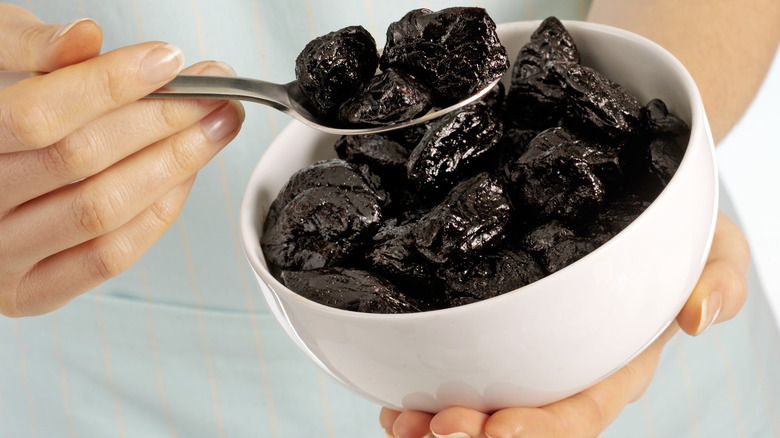Could Eating Prunes Daily Help Lower Your Risk For Osteoporosis?
The natural progression of bone fragility as we grow older affects individuals across gender, race, and all ages around the world (via European Journal of Rheumatology). The International Osteoporosis Foundation cites that 1 in 5 men and 1 in 3 women 50 years of age and older can expect to experience a bone fracture due to osteoporosis at some point in their lives. More common in females, the U.S. Centers for Disease Control and Prevention (CDC) reports that between 2017 and 2018, 18.8% of females over the age of 50 were diagnosed with osteoporosis of the femur neck or lumbar spine, compared to 4.2% of males.
Reduced estrogen production during menopause can prompt inflammation in the body, furthering the loss of bone mass (via MedicalNewsToday). Now, a recent study published in Advances in Nutrition indicates that eating 6-12 prunes a day could help reduce inflammation associated with the development of osteoporosis.
Eating 6-12 prunes per day may reduce inflammation
In an examination of more than 100 women with low bone density in their mid-50s to mid-70s, researchers set out to determine how eating prunes on a daily basis impacted patient inflammation over the course of 1 year, per MedicalNewsToday. Split into 3 groups, participants were assigned to eat either 6 prunes per day, 12 prunes per day, or no prunes at all — in addition to taking vitamin D and calcium supplements. At the end of 12 months, blood tests showed that the prune-eating groups experienced decreases in inflammation compared to those who did not eat prunes.
"Our findings suggest that consumption of six to 12 prunes per day may reduce pro-inflammatory mediators that may contribute to bone loss in postmenopausal women," lead study author Janhavi Damani told MedicalNewsToday, commenting on the significance of their findings. "Thus, prunes might be a promising nutritional intervention to prevent the rise in inflammatory mediators often observed as part of the aging process."
While the study focused primarily on inflammation markers rather than exact bone density measurements, the research suggests that eating prunes — a fruit rich in antioxidants — may help protect against bone inflammation. In turn, this may help prevent bone loss and decrease one's chances of developing osteoporosis.


